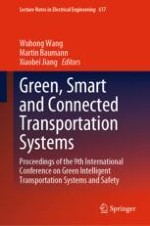2020 | OriginalPaper | Chapter
An Integrated Energy-Efficient Scheduling and Train Control Model with Regenerative Braking for Metro System
Authors : Xinchen Ran, Shaokuan Chen, Lei Chen
Published in: Green, Smart and Connected Transportation Systems
Publisher: Springer Singapore
Activate our intelligent search to find suitable subject content or patents.
Select sections of text to find matching patents with Artificial Intelligence. powered by
Select sections of text to find additional relevant content using AI-assisted search. powered by
